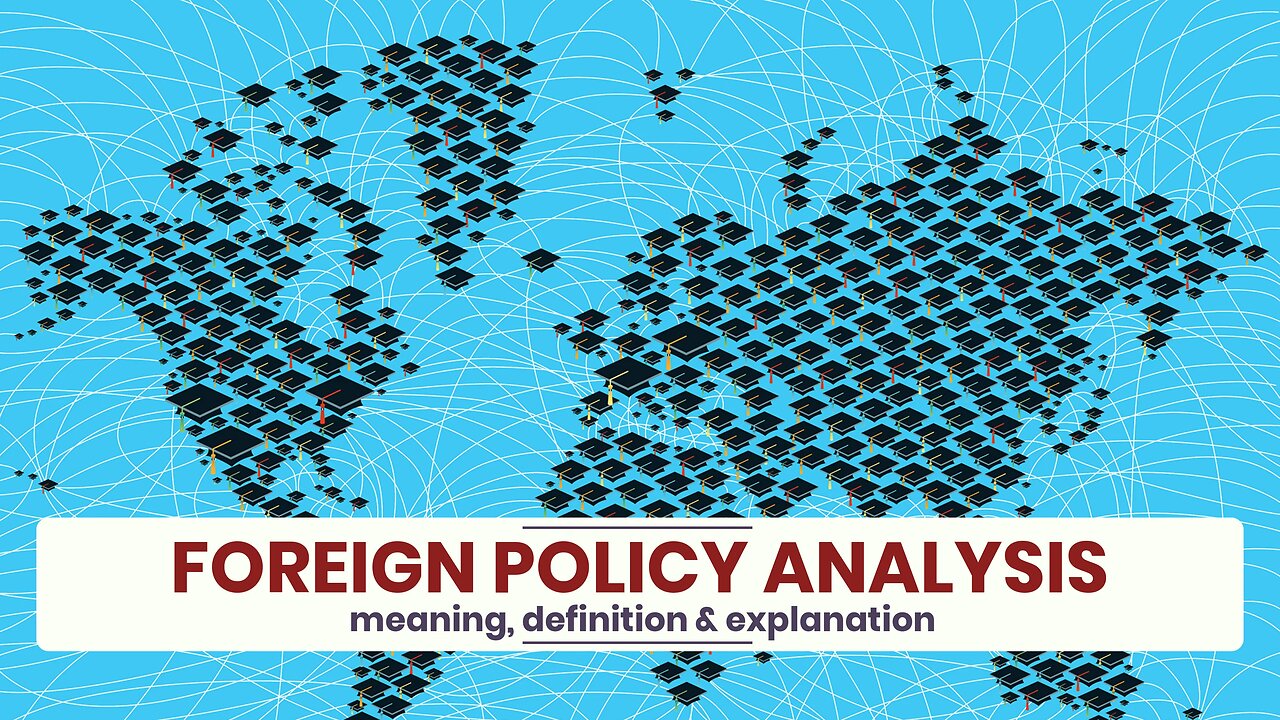Premium Only Content

What is FOREIGN POLICY ANALYSIS?
✪✪✪✪✪
http://www.theaudiopedia.com
✪✪✪✪✪
What does FOREIGN POLICY ANALYSIS mean? FOREIGN POLICY ANALYSIS meaning - FOREIGN POLICY ANALYSIS definition - FOREIGN POLICY ANALYSIS explanation. What is the meaning of FOREIGN POLICY ANALYSIS? What is the definition of FOREIGN POLICY ANALYSIS? What does FOREIGN POLICY ANALYSIS stand for? What is FOREIGN POLICY ANALYSIS meaning? What is FOREIGN POLICY ANALYSIS definition?
Foreign policy analysis (FPA) is a branch of political science dealing with theory development and empirical study regarding the processes and outcomes of foreign policy.
Foreign policy analysis is the study of the management of external relations and activities of state. Foreign policy involves goals, strategies, measures, methods, guidelines, directives, agreements, and so on. National governments may conduct international relations not only with other nation-states but also with international organizations and non-governmental organizations.
Managing foreign relations need carefully considered plans of actions that are adapted to foreign interests and concerns of the government.
Foreign policy analysis involves the study of how a state makes foreign policy. As it analyzes the decision making process, FPA involves the study of both international and domestic politics. FPA also draws upon the study of diplomacy, war, intergovernmental organizations, and economic sanctions, each of which are means by which a state may implement foreign policy. In academia, foreign policy analysis is most commonly taught within the discipline of public policy within political science or political studies, and the study of international relations. FPA can also be considered a sub-field of the study of international relations, which aims to understand the processes behind foreign policy decision making. The most prominent scholars in this field of study include Richard Snyder, James Rosenau, Alexander George, Graham Allison and Irving Janis.
According to foreignpolicyanalysis.org, "As a field of study, foreign policy analysis is characterized by its actor-specific focus. In the simplest terms, it is the study of the process, effects, causes, or outputs of foreign policy decision-making in either a comparative or case-specific manner. The underlying and often implicit argument theorizes that human beings, acting as a group or within a group, compose and cause change in international politics." In other words, Foreign Policy Analysis can be understood as a critique of the dominant structuralist approaches in international relations.
The making of foreign policy involves a number of stages:
Assessment of the international and domestic political environment - Foreign policy is made and implemented within an international and domestic political context, which must be understood by a state in order to determine the best foreign policy option. For example, a state may need to respond to an international crisis.
Goal setting - A state has multiple foreign policy goals. A state must determine which goal is affected by the international and domestic political environment at any given time. In addition, foreign policy goals may conflict, which will require the state to prioritize.
Determination of policy options - A state must then determine what policy options are available to meet the goal or goals set in light of the political environment. This will involve an assessment of the state's capacity implement policy options and an assessment of the consequences of each policy option.
Formal decision making action - A formal foreign policy decision will be taken at some level within a government. Foreign policy decisions are usually made by the executive branch of government. Common governmental actors or institutions which make foreign policy decisions include: the head of state (such as a president) or head of government (such as a prime minister), cabinet, or minister.
Implementation of chosen policy option - Once a foreign policy option has been chosen, and a formal decision has been made, then the policy must be implemented. Foreign policy is most commonly implemented by specialist foreign policy arms of the state bureaucracy, such as a Ministry of Foreign Affairs or State Department. Other departments may also have a role in implementing foreign policy, such as departments for: trade, defence, and aid.
-
 1:52
1:52
The Audiopedia
9 months agoWhat is EXECUTIVE DIRECTOR?
531 -
 14:39
14:39
Talk Nerdy Sports - The Ultimate Sports Betting Podcast
4 hours ago3/30/25 - 🎙 Sunday Funday Fire: 10 Sharp Bets, 5 Parlays & 2 Locks That Hit Different
29.5K1 -
 3:15:38
3:15:38
arrowthorn
3 hours ago $0.25 earnedcasual sunday vibes
8.29K -
 7:33:37
7:33:37
DookiePox
9 hours ago $1.89 earnedGood Morning. Sunday Morning.
36.6K1 -
 2:01:52
2:01:52
Game On!
23 hours ago $16.84 earnedMarch Madness Final 4 Will Be Set TODAY!
81.2K5 -
 3:41:49
3:41:49
LumpyPotatoX2
7 hours agoHunt Shadows Family Sunday - #RumbleGaming
53.3K4 -
 5:04
5:04
Film Threat
1 day agoA WORKING MAN | Film Threat Reviews
50K5 -
 LIVE
LIVE
NeoX5
6 hours agoAssassin's Creed: Shadows - Wheelin and Dealin #Factor75partner | Part 6 | Rumble Gaming
47 watching -
 LIVE
LIVE
Chi-Town Gamers Livestreams
5 hours ago $1.28 earnedBaldur's Gate 3 W/ CTG & XayRico Ep. 4 | Then The Finals | 9 Hour Stream...LFG!
82 watching -
 6:00:26
6:00:26
DarknessGames
19 hours agoIT'S BACK! - Dark Souls II (Part 7)
35.9K